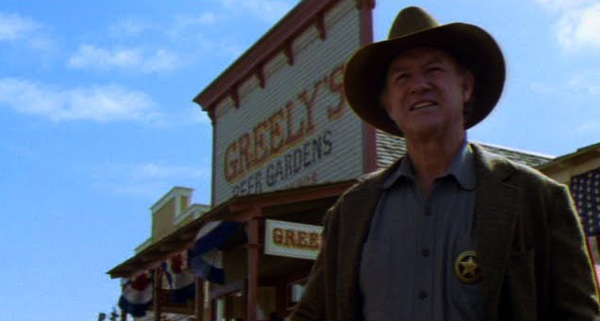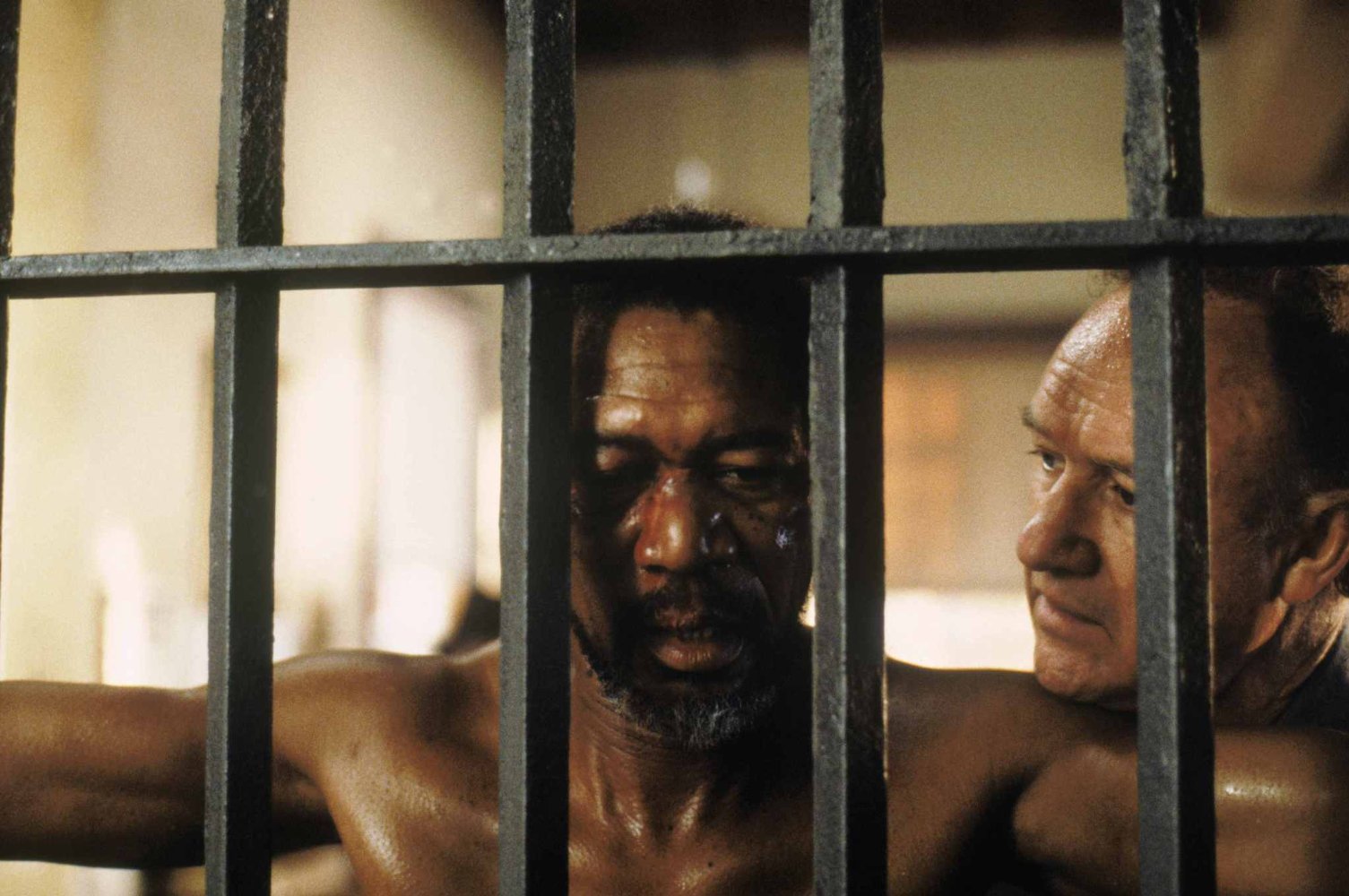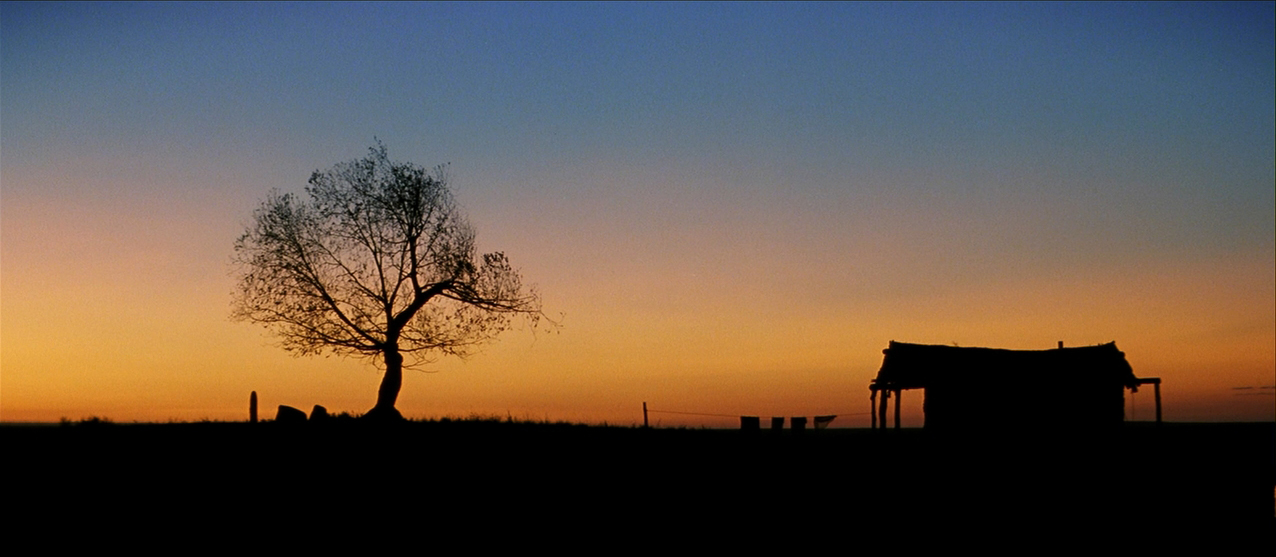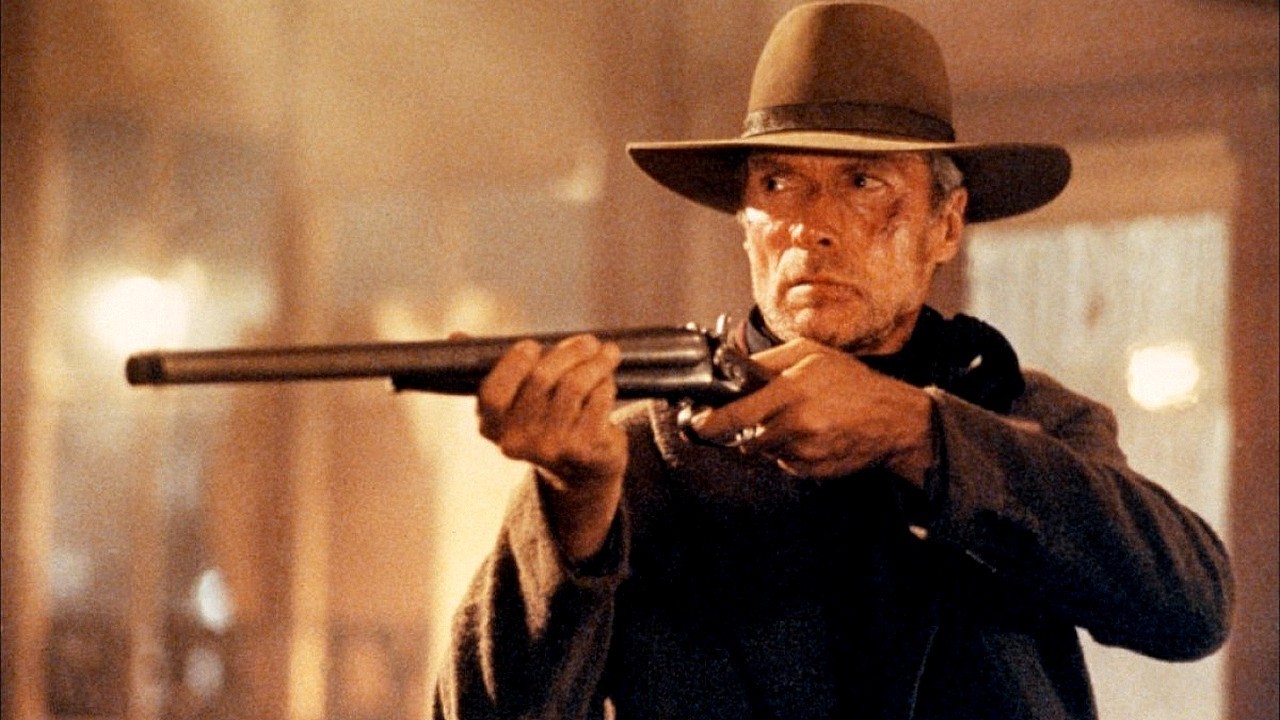5. It has a sly sense of humor

With the main characters being of a more advanced age than the main characters usually are in Westerns, it allows Eastwood and writer David Webb Peoples to have some fun at their expense. Throughout the film, Munny struggles to get on his horse. It is quite the opposite from the elegance we usually see from cowboy protagonists.
The script also introduces a writer, played by Saul Rubinek, who follows gunslingers around, writing fantastically of their adventures. He is also woefully unsuited to participate in the Wyoming justice being meted out by his subjects. The film mines more humor from his situations, as he pees his pants in fear in one early scene.
The opening of the film provides context and background but also enough silliness to keep it loose before the story takes it violent and dramatic turn. Even Hackman’s character gets to have a some fun, fixing stories the writer has been telling about Harris’ English Bob, restoring them to their darkly comic truth.
The writer pathetically resorts to pronouncing “duke” as “duck,” following the example of the literate but stubborn Little Bill. The blend of sly humor and looming violence makes for an unsettling ride.
6. It’s a melancholy rumination on violence and murder

This is the main reason that Unforgiven entered the Western pantheon (and the general film pantheon as well). Unlike many previous Westerns, Unforgiven vigorously grapples with the consequences of disregarding human life.
It also more fully elucidates the lust for vengeance and bloodshed. This is demonstrated most profoundly in the character of The Schofield Kid, who jumpstarts the plot by enlisting Munny to come with him to murder the two men and collect the bounty being offered by the prostitutes. The Schofield Kid brags about the men he has killed and openly admits that he wants to be a famous gunman like Munny.
Munny does see some opportunities to mentor the kid and, in fact, when they find the second of the two men and have him trapped in an outhouse, gives The Kid the opportunity to shoot him. The Kid finishes the job but not without realizing what a terrible thing it is to murder someone in cold blood. (Leading to the movie’s most famous line, “It’s a hell of thing killing a man.”) He vows never to kill again. He represents any person who is seduced by the idea of violence but quickly realizes its destructive consequences.
When Munny’s life of butchery catches up to him, as Little Bill kills Ned while torturing him for information, his sense of Western justice demands that he punish Little Bill for what he has done. Here, then, are the demonstrated ramifications of the life The Schofield Kid thought he coveted.
Ned, sadly, paid for the sins of his previous life of inhumanity. Munny must now seek vengeance. Similarly, Little Bill’s sadism-as-righteousness act has reached its pinnacle: he uses Ned’s body as a warning for any other outlaws who are considering taking him on.
As these two men inexorably gravitate toward each other for their final clash, a sense of impending dread hangs over the proceedings. Both men deal in the currency of pain and savagery. No payback for them is complete if the receiver is still breathing. Living a life by these rules has damaged their psyches.
As Munny says in another of the movie’s most recognized lines, “We all got it coming.” To traffic in bloodshed and be at peace with it is to turn life into one long death march, albeit an exhilarating one.
7. It employs music more frugally than other Westerns, to great effect

Westerns like Dances with Wolves, Stagecoach, High Noon, and Butch Cassidy and the Sundance Kid, with their suggestive and/or sweeping scores, won Best Score at the Oscars. Unforgiven has a much sparser soundtrack, preferring to emphasize the loneliness and barrenness of the West through silence.
As characters talk or even during tense moments, Eastwood lets the scenes speak for themselves. Obviously, music is an integral part of moviemaking and the score by Lennie Niehaus (with contributions by Eastwood himself) is effective when utilized. The dread it communicates when Munny sees Ned’s body sitting in an upright casket is eerie and emotional.
Throughout the film, as scenes get intense, the music mostly stays away, allowing the tension to build naturally. In the climactic scene, as Munny and Little Bill face off, Eastwood and his team accentuate the metallic clang of Munny’s spurs as he moves about the room.
Little Bill and his cronies are shocked at the audacity of Munny. They had expected to have to hunt him down. Instead, he faces them by himself with no fear. Instead of punctuating the scene with music suggesting their awkwardness or having the music slowly creep in to ratchet up the tension, Eastwood leaves it out and it takes care of the uncomfortable feeling by itself.
The spurs ring every step that he takes, calling attention to the stillness in the room. Each ring sounds the impending doom of anyone that dares to challenge him. It takes restraint and trust to believe that the actors and the production design and the writing can provide the necessary feeling without the aid of music. Unforgiven shows that it is even possible in a Western–a genre often built on its score.
8. Its ambiguous ending allows for continued introspection

Though No Country for Old Men boasts a much more ambiguous ending (some would argue impenetrable), Unforgiven’s closing moments are more resonant. The events that have taken place are clear and easy to process, but the repercussions are much more complex.
Unforgiven invites us to root for a cold-blooded killer. The antagonist is a sheriff and the most likeable member of the main cast is killed. Like many movies that challenge conventional perceptions of morality, Unforgiven gives no final word on who is a hero and who is a villain. Every character sacrifices some “good” part of themselves in order to get revenge.
When Munny rides away at the end, he is alone, friendless, wife-less, and as hardened as he has ever been. Yet, he is more alive and engaged than he has been in the time since his wife died.
On the one hand, this is not a man given to visiting whorehouses but, on the other hand, a man who just gunned down many people, including one who was obviously unarmed. His sense of justice drove him to massacre whoever got in his way. However, it was a sense of desperation that made him leave his home and children behind in the first place.
Viewers can relate to doing what you need to for your family. Viewers can also relate to acting with a sense of integrity to right wrongs. It is much less easy for viewers to relate to murder and a lust for blood–or is it? In presenting another complex antihero, Unforgiven does not break new ground.
In establishing that antihero as a somewhat frail and silly old man at the beginning of the film and transitioning him back into a gifted murderer, though, the movie challenges what destiny really means. Has William Munny been wasting his life as a Wyoming pig farmer? The implication is yes: only through restoring his brutality is Munny made whole again.
Author Bio: Chad Durham is co-editor and contributing writer for RogueAuteurs.com. He also participates bi-monthly in the Rogue Auteurs podcast. His day job is high school English teacher. He has been in love with movies since seeing The Sting when he was 12. The thrill and emotion of seeing a great movie for the first time will always be one of his favorite feelings.